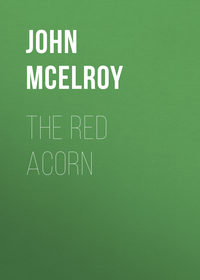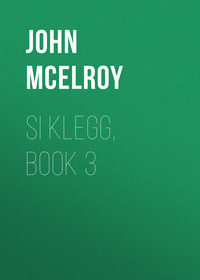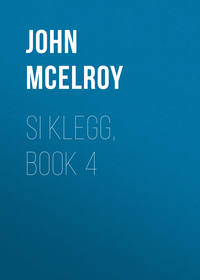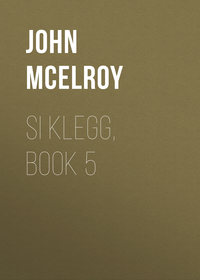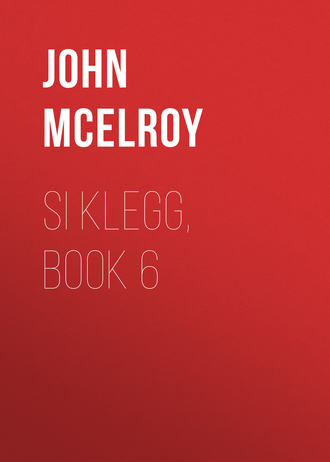 полная версия
полная версияSi Klegg, Book 6
The yells that soon rose from that thicket would have indicated that either a boy was being skinned alive or was having his face washed by his mother.
CHAPTER IX. SI TAKES HIS BOYS FOR A LITTLE MARCH INTO THE COUNTRY
"SI," said the Orderly-Sergeant, "here's a chance to give them pin-feather roosters o' yours a little taste of active service, that'll be good seasoning for 'em, and help develop their hackles and spurs."
"Good idee. What is it?" responded Si with alacrity.
"An order's come down from Headquarters to detail a Sergeant and eight men from the company to go out about eight or 10 miles in the country, and take a turn guarding a little mill they're running out there, grinding meal. There's a gang of bushwhackers around there, that occasionally pester the men at work and they've tried once to burn the mill. I don't think you'll have much trouble, but you've got to keep your eye peeled, and not let any of your boys go to sleep on post."
"I'll look out for that."
"I know you will. You'll take Shorty along, and your seven kids, which'll make up the number. You'll draw three days' rations, at the end of which time you'll be relieved."
"Now, boys," said Si, returning to his squad, "we won't drill today, but are going out on some real soldierin'. The Kurnel has given us a very important detail."
The boys swelled up visibly at the news.
"I want you to all act like soldiers, now," continued Si, "and be a credit to the company and the rijiment. We're goin' to be all by ourselves, and everybody's eyes 'll be on us."
"Yes," echoed Shorty, "we'll be the only part o' the rijiment at the front, and we want to git a good stiff brace on ourselves, because if we don't some o' these other rijiments may git the grand laugh on us."
Shorty's tone was that this was a calamity to which death was preferable, and the boys were correspondingly impressed. They were rapidly learning the lesson that the regiment and its reputation were the most important things in the whole world.
"Come along, and le's draw our rations," said Si. "And you boys want to keep in mind that this's all you'll git for three days, and govern yourselves accordingly. The 'Leventh Commandment is to take all that you kin git, and take mighty good care of it after you git it—"
"For sich is the Kingdom of Heaven," interjected Shorty, imitating the Chaplain's tone.
"No," said Si, who was irritated by his partner's irreverence: "but it's the way a good soldier does. His first dooty's to take care o' his grub, because that's takin' care o' himself, and keepin' himself in good shape to do the dooty the Government expects o' him. 'Tain't servin' the Government right for him to be careless about himself. Now here's 27 rations o' bread, meat, coffee, sugar, salt and beans—three apiece for each of us. Harry Joslyn, you and Gid Mack divide them up into nine equal piles."
Si and Shorty turned to give directions about packing up the shelter-tents and blankets for carrying.
"Now, Gid Mackall," said Harry, "play fair, if you ever did in your life. I won't have none o' your shenanniging."
"Don't talk to me about shenanniging, you little imp," responded Gid cordially. "You can't do a straight thing if you try, and you never try. You never fisted-up with me on a ball-bat that you didn't slip your hand so's to come out ahead."
"Now, there's three loaves o' bread for the Sargint," said Harry, laying them down on a newspaper. "There's three for the Corpril; there's three for me; there's three for you."
"Here, what're you givin' me that broken loaf for?" demanded Gid, stopping in his distribution of meat. "Give that to Pete Skidmore. He's the littlest."
"Ain't goin' to do nothin' o' the kind," responded Harry. "You've got to take things as they come. That loaf fell to you, and you've got to keep it."
"If you don't take that nubbin loaf away and put a full one in its place, not a speck o' lean meat 'll you get—nothin' but fat six inches thick."
"You'll cut that meat straight across, and give me my right share o' lean, you puddin'-headed, sandhill crane," shouted Harry.
"Who're you a-calling names, you bow-legged little shrimp?" shouted Gid, slapping Harry across the face with a piece of fat pork.
An angry mix-up, school boy rules, followed, to the great detriment of the rations. Si and Shorty rushed up, separated the combatants, and administered shakes, cuffs, and sharp reprimands.
"Now, you quarrelsome little whelps," said Si, after quiet had been restored, "you've got to take them rations that you've spiled for yourselves. You shan't have no other. Put that bread and that meat you've kicked around into your own haversacks. Then go back there and roll up your blankets—same as the other boys. Alf Russell, you and Jim Humphreys come here and divide the rest o' these rations into seven parts, if you kin do it without fightin'."
The division of the rations proceeded, with some jars between Russell and Humphreys over the apportionment of fat and lean meat, and angry protests from little Pete Skidmore because they made his share smaller than anybody else's.
"Yit," said he, "I've got to march just as far as any of you, carry just as big a gun, and do just as much shootin'."
"You're wrong," said the medical-minded Alf Russell. "You ought to have less than the others, because you're smaller. The littler and younger the person the smaller the dose, always."
"No," acceded the farmer Jim Humphreys. "Tain't natural, nor right. You don't give a colt as much feed as you do a grown horse. Anybody knows that."
"Pete's plea is sound," contraverted the legal-minded Monty Scruggs. "All men are equal before the law, though they mayn't be a foot high. Rations are a matter of law, and the law's no respecter of persons."
"Rations is intended," persisted Alf, "to give a man what he needs to eat—nothing more, nothing less. Pete don't need as much as a man; why give it to him? There'd be just as much sense in giving him the clothes for a six-footer."
"All o' you are always imposin' on me 'cause I'm little," whimpered Pete. "And that stuck-up Alf Russell's the worst of all. Just because he's goin' to be a doctor, and leads in singin' at church, he thinks he knows more'n the man what writ the arithmetic, and he's down on me because I won't take all he says for law and gospel, in spite of his airs. Jim Humphreys is down on me, because I writ home that I'd shot a man back there at the burnt bridge, and Jim got skeered at a coon-huntin' nigger."
"Never mind, Pete," said Monty consolingly, "none o' them shall impose on you while I'm around. Now, Alf, you and Jim give Pete just as much as the rest, or I'll make you."
"Who'll you make, you brindle steer?" said Alf, laying down his bread and bristling up.
"Stand back, Alf; he meant me," said Jim, disposing his meat, and approaching Monty with doubled fists. "Now, Mister Scruggs, le's see you do some makin', since you're so brash."
"Here, stop that, you little scamps," shouted Si, whose attention had been so far devoted to quieting Harry and Gid, and showing them how to prepare their traps for marching. "Great Scott, can't you git along without fightin'? I'm goin' to take you where you'll git real fightin' enough to satisfy you.
"Go ahead, there, and divide them rations, as I ordered you, and be quick about it, for we must hurry off."
The mention of real fighting immediately sobered up the boys, and made them forget their squabbles. They hurried about their work with quickened zeal.
"Now," said Si, "pack your rations carefully in your haversacks, just as you see me and Corpril Elliott doin'. First, keep your sugar, coffee and salt separate. Put 'em in little tin boxes, like these, and see that the lids are on tight. Hurry up, now. Shorty, you'd better look over the boxes, and go up and draw as many cartridges as you think we'll need."
The mention of need for cartridges was an electric impulse which set the boys keenly alive. They bundled their rations into their haversacks, and flung their blanket rolls over their shoulders, and were standing in a state of palpitating expectancy, when Shorty came back with his hands full of cartridges, which he proceeded to distribute.
"Take arms," commanded Si. "Forward!—March!"
Si and Shorty started off with their long, easy campaign stride, which, in some incomprehensible way that the veteran only learns by practice, brought their feet down every time in exactly the right place, avoiding all stumbling-blocks, and covering without apparent effort a long distance in the course of an hour. The boys pattered industriously after, doing their best to keep up, but stumbling over roots and stones, and slipping on steep places, and dropping to the rear in spite of themselves.
When Si made the customary halt at the end of the first hour, his little command was strung back for a quarter of a mile, and little Pete Skidmore was out of sight.
"Better go back and look for little Pete, Shorty," said Si. "We seem to be losin' him."
Pete was soon brought up, panting and tired.
"Dod durn it, what're you all runnin' away from me for?" he gasped. "Want to lose me? Want to git into the fight all by yourselves, and leave me out? Think because I'm little I can't help? I kin shoot as well as anybody in the crowd, dod durn you."
"There, you see the nonsense o' giving you as much rations as the others," suggested Alf Russell. "You can't pack 'em, and you wouldn't need 'em if you did pack 'em."
"What business is it of yours. Mister Russell, I'd like to know," asked Monty Scruggs, "what he does with his rations. His rations are his rights, and he's entitled to 'em. It's nobody's business what use a man makes of his rights."
"Where are these rebels that we're goin' to fight?" asked Harry Joslyn, eagerly scanning the horizon. "I've been looking for 'em all along, but couldn't see none. Was you in such a hurry for fear they'd get away, and have they got away?"
"I wasn't in no hurry," answered Si. "That was only regler marchin' gait."
"Holy smoke," murmured the rest, wiping their foreheads; "we thought you was trying to run the rebels down."
"Don't be discouraged, boys," said Si. "You'll soon git used to marchin' that way right along, and never thinking of it. It may seem a little hard now, but it won't last long. I guess you're rested enough. Attention! Forward!—March!"
Si and Shorty had mercifully intended to slow down a little, and not push the boys. But as they pulled out they forgot themselves, and fell again into their long, swinging stride, that soon strung the boys out worse than ever, especially as they were not now buoyed up by an expectation of meeting the enemy.
"We must march slower. Si," said Shorty, glancing ruefully back, "or we'll lose every blamed one o' them boys. They're too green yit."
"That's so," accorded Si. "It's like tryin' to make a grass-bellied horse run a quarter-stretch."
"Might I inquire," asked Monty Scruggs, as he came up, wiped his face and sat down on a rock, "whether this is what you'd call a forced march, or merely a free-will trial trot for a record."
"Neither," answered Si. "It's only a common, straight, every-day march out into the country. You kin count upon one a day like this for the rest o' your natural lives—I mean your service. It's part o' what you enlisted for. And this's only a beginnin'. Some days you'll have to keep this up 15 or 18 hours at a stretch."
There was a general groan of dismay.
"Gracious, I wish I'd wings, or that I'd enlisted in the cavalry," sighed Harry.
"Brace up! Brace up!" said Shorty. "You'll soon git used to it, and make your 40 miles a day like the rest of us, carrying your bed-clothes and family groceries with you. It's all in gittin' used to it, as the man said who'd bin skinnin' eels for 40 years, and that now they didn't mind it a bit."
"Well, le's jog along," said Si. "We ought to git there in another hour. There's a big rain comin' up, and we want to git under cover before it strikes us. Forward!—March!"
But the rain was nearer that Si thought. It came, as the Spring rains come in the North Georgia mountains—as if Niagara had been shifted into the clouds overhead. The boys were literally washed off the road, and clung to saplings to avoid being carried away into the brush.
"I'll fall back and keep the boys together," said Shorty, as soon as an intermission allowed them to speak.
"Alright," said Si. "Look out for little Pete." And Si began to forge stolidly ahead.
"Goodness, Sarjint, you're not going to travel in such a storm as this," gasped Gid Mackall.
"Certainly," Si called back. "Come on. We've got to reach that mill tonight, no matter what happens. You'd might as well be drowned marchin' as standin' still. 'Tain't rainin' no worse further ahead than here. Forward!"
"Close up, boys," said Shorty, taking little Pete's gun and the youngster's hand. "This's only a Spring shower. 'Tain't nothin' to what we had on the Tullyhomy Campaign. There the drops was as big as punkins, and come as thick as the grains on a ear o' corn. Close up, there; dodge the big drops, and go ahead."
"Hold on to me tight! Hold on to me!" clamored little Pete. "If you don't I'll be washed away and lost for sure."
"Come along, Peter, my son," Shorty assured him.
"I hain't never lost no children yit, and I hain't goin' to begin with you."
The storm grew more violent every minute, limbs were torn from the trees, and fell with a crash, and torrents rushed down from the mountain side, across the road. Si strode on resolutely, as if the disturbance were nothing more than a Summer zephyr. He waded squarely through the raging streams, turning at times to help the next boy to him, strode over the fallen limbs, and took the dashing downpour with stolid indifference.
"Close up, boys! Close up!" shouted Shorty from time to time, "Don't mind a little sprinkle like this. It'll lay the dust, and make marchin' easier. Come along, Peter, my son. I'm not goin' to lose you."
Night suddenly came, with pitchy darkness, but Si steadily forged onward. Then the rain ceased as suddenly as it began, but the road was encumbered with fallen timber and swirling races of muddy water. They seemed more uncomfortable even than when the rain was falling. They were now nearing the mill, and the sound of a fitful musketry fire came to their ears.
"They've sneaked up in the storm to attack the mill," Si called out to Shorty. "Close up and prepare for action."
"Goodness," gasped Gid Mackall, much of whose vim had been soaked out of him by the fearful downpour, and who was oppressed by fatigue, hunger, and the dense blackness of the night in the strange woods. "You don't have to fight when you're wetter'n a drowned rat, and so tired you're ready to drop, do you?"
"That's what you do," said Shorty, wiping off his musket. "That's the way you'll have to do most o' your fightin'. The miserabler you feel the miserabler you want to make the other fellers feel. Boys, turn your guns upside down and let the water run out. Then half-cock 'em, and blow into 'em to clean the water out o' the tubes. Then find a dry rag somewhere about you, and wipe off the nipples. We want every gun to go off when the order is given. Don't anybody load till Si gives the order."
The drenched but excited boys followed his directions with nervous haste. Shorty took one gun after another and examined it, while Si went forward a little ways to reconnoiter. The calm deliberation of the partners steadied the nervous boys.
"Load," called back Si, from the vantage ground of a little knoll, upon which he was standing, trying to see into the darkness beyond. A volley from out in front responded to the sound of his voice, and bullets knocked bark off the big chestnut behind which he had shrewdly taken refuge.
"Jest as I expected, Si," Shorty called back to him. "The rebels have throwed back a squad to watch for us."
"Yes," said Si, coolly, as he stepped back to meet the boys. "There ain't but 10 o' them, though. I counted every flash and located 'em. They're all in a bunch right over there by a dead tree to the left. Move up there quick, aim a little to the left. Aim low, and fire just as we reach the rise. I'll fire first, and the rest of you foller. Try to hit something, every one of you."
CHAPTER X. THE BOYS HAVE A COUPLE OF LITTLE SKIRMISHES
BUT FINALLY GET TO THE MILLTHE time and the surroundings were such as to bring the spirits of the boys to their lowest ebb.
The gloomy, mysterious woods seemed a world's distance away from their homes, friends and assistance.
The long, tiresome tramp, the violent rainstorm, which had soaked them to their skins, and apparently found its way to their hearts; the muddy, slippery road, with torrents rushing across it, the splashing, searching rivulets from the boughs overhead, were all deeply depressing.
The boys huddled together, as if to gain courage by closer contact.
"Gracious, I never supposed they'd pull off a fight at night, when everybody was tired to death and soaked to a gruel," said Alf Russell in a shivery whisper.
"They fought at Hohenlinden at night, and on the snow," answered Monty Scruggs. "But snow's not so bad as rain, and, then, they didn't have these awful woods. I'd feel much better if we was out in a clearing somewhere."
"Come into line to the left, there," commanded Si, in a low tone. "Deploy, one pace apart. Shorty, take the left out there in the bushes. Don't make no noise, step carefully, and don't shoot till I do."
"Keep near me, Pete, and you won't git lost," said Shorty, as he stepped off into the brush.
–"Must I shoot the same time you do, or wait till you shoot?" asked Pete, who seemed less depressed by his surroundings than the others, and mainly eager to get a chance to shoot.
"Don't watch me," cautioned Shorty. "Watch the fellers you are shootin' at, and try to hit 'em. Fire just as soon as you want to after you hear the others."
"I'll bet I'll hit a rebel if anybody does," said Pete with hopeful animation.
They tramped forward a few steps over the spongy ground, and through the dripping bushes.
The musketry fire continued fitfully around the mill in the distance.
They came to the summit of the little rise.
"Hist—halt; lay down, quick," called the watchful Si, in a penetrating voice. "They've loaded agin', and are about to shoot."
He and Shorty were down on their faces as he spoke. The others obeyed more slowly and clumsily. The rebel volley cut the limbs and bushes over their heads, and whistled viciously through the damp air and the darkness.
As little Pete dropped to the ground, his nervous finger touched the trigger and his gun went off up in the air. The others took this as a cue, and banged away as rapidly as they could get their muskets off.
Only Si and Shorty, in dropping, had kept the lay of the ground in view, and without rising they deliberately aimed their pieces whither the volley had come and fired. A suppressed yell of pain came from the other side.
"We salted one of 'em, anyway," chuckled Shorty, as he raised on his knee to reload his gun.
"Gosh all Chrismus," said Si, using his most formidable swear-word, for he was very angry. "What was you brats shootin' at? Squirrels or angels? A rebel'd had to be 80 cubits high, like old Haman, for one o' you to've hit him. Lots o' good o' your packin' around guns and cartridges, if you're goin' to waste your ammynition on the malaria in the clouds. Load agin, now, carefully, and when you shoot agin be sure to fetch something. I'll take my ramrod to the next boy that I ketch shootin' higher'n a man's head. This ain't no Fourth-o'-July business. Our job's te kill them whangdoodles over there, and I want you to 'tend strictly to that."
The threat of a real boyish thrashing and the cool, matter-of-fact way that Si and Shorty conducted themselves—precisely as if chopping trees or mowing a field—steadied the boys wonderfully.
"They're about ready to shoot agin," Si spoke down the line, in a penetrating whisper. "Everybody hug the ground, and watch the flashes. Each feller git a good line on the flash straight in front of him, and let the hound have a chunk o' lead just below his belt. If you're all real good, and shoot just right, I'll take you on a rush right at them fellers, and we'll scatter what's left like a flock o' quail. Lay low. There it comes agin. Lay low."
An irregular volley burnt out in the blackness beyond. The bullets sang around much closer than before, and several of them struck near Si, one landing in the leaves and moss directly in front of him, and throwing a wet sprinkle in his face.
"Like the parrot, I was talkin' too much and too loud," thought Si. "They wuz all reachin' for me, and one feller made a mighty good line shot. Le's see if I can't better him."
He drew down in his sights as carefully as he could in the darkness, and pulled the trigger. As the smoke thinned out a little he thought he saw something beyond which indicated a man staggering and falling.
This time the boys seemed to be firing effectively. There was a commotion in the woods beyond, and the sound of groans on the damp air.
"Raise up!" shouted Si. "Forward! Forward! Jump 'em. Jump 'em before they kin load agin!"
Loading his gun with the practiced ease of a veteran as he rushed forward, Si led his squad directly against the position of the rebels. Part of the rebels had promptly run away, as they heard Si order the charge, but part boldly stood their ground, and were nervously reloading, or fixing bayonets, as the squad came crashing through the brush. One of the rebels fired a hasty, ineffectual shot, and by its light Shorty saw the nervous little Pete, who had torn off his cumbering haversack, letting his hat go with it, slip between him and Si, and gain a pace in advance.
"Git back, you little rat," said Shorty, reaching out a long arm, catching the boy by the collar, and yanking him back. "Git behind me and stay there."
The flash revealed another rebel fumbling for a cap. Shorty's gun came down, and the rebel fell, shot through the shoulder. The rebel leader, a long haired, lathy man, with the quickness of a wildcat, sprang at Si with his bayonet fixed. Heavy-footed and deliberate as Si usually was, when the electricity of a fight was in him there was no lack of celerity. He caught the rebel's bayonet on his musket-barrel and warded it off so completely that the rebel shot by him in the impetus of his own rush. As he passed Si delivered a stunning blow on the back of his head with his gun-barrel.
"That zouave drill was a mighty good thing, after all," thought Si, as he turned from his prostrate foe to the others.
While this was going on, the boys were imitating Shorty's example, getting their guns loaded, and banging away as fast as they did so into the rebels, who went down under the shots, or ran off, leaving one of their number, a tall, lank mountaineer, who seemed beside himself with rage. He had grasped his empty gun by the stock, and was swinging it around his head, yelling fierce insults and defiance to the whole race o' Yankees.
"Come on, you infernal pack o' white-livered, nigger-stealin', house-robbin', hell-desarvin' hypocrites," he shouted. "I kin lick the hull bilin' o' yo'uns. This is my wounded pardner here, and yo'uns can't have neither me nor him till yo'uns down me, which y' can't do. Come on, y' pigeon-livered cowards."
The boys who had pressed lip near him, shrank back a little, out of possible range of that violently brandished musket, and began loading their guns.
Shorty had stopped for an instant to turn over into an easier position the rebel he had shot.
Si paced up. His gun was loaded, and he could have easily brought the rebel down. But the rebel's devotion to his partner touched him.
"Don't shoot, boys," he commanded; "leave me to 'tend to him. Say, Johnny," he addressed the rebel, in a placatory way, "don't make a fool o' yourself. Come down, we've got you, dead. Drop that gun."
"Go to brimstone blazes," shouted the rebel. "If yo'uns have got me, why don't y' take me. I kin lick the hull caboodle o' y' sneakin' mulatters. Come on, why don't y'?"
"Give him a wad, Si," said Shorty, reloading his own gun. "We haint no time to lose. They need us over there."
"No, don't anybody shoot," commanded Si; "he's just crazy about his partner. He's too brave a man to kill. Say, Johnny, have a little sense. We haint goin' to hurt your partner, nor you, if you'll behave. Drop that gun at once, and surrender."



